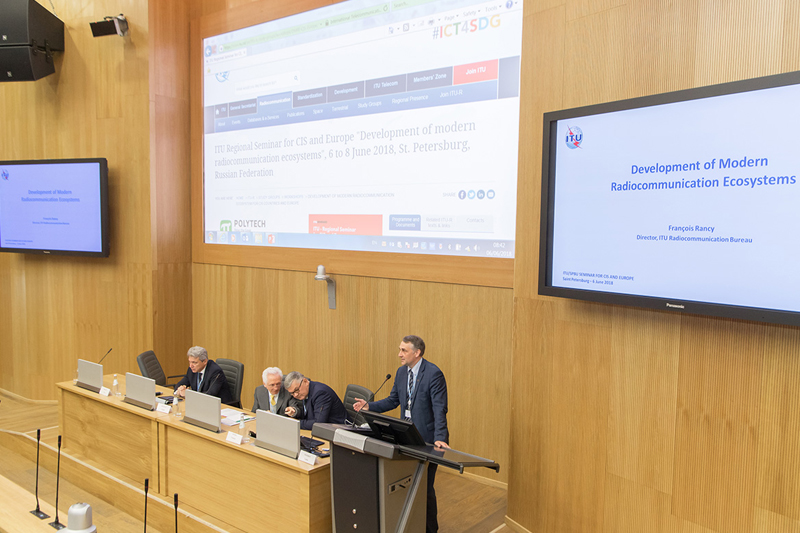International Seminar on the Development of the Modern Radio Communication Ecosystem

Peter the Great St. Petersburg Polytechnic University and the International Telecommunication Union (ITU) held a joint seminar for the CIS and European countries dedicated to the Development of the Modern Radio Communication Ecosystem. More than 150 experts from 20 plus countries took part in it.
Greeting the audience, SPbPU Vice Rector on Research Activities V.V. SERGEYEV noted that areas related to radio and telecommunications have traditionally had a high priority for Polytechnic University. Two years ago, SPbPU became an ITU Academy, while last year, with support of the Union, the University had implemented a new project of implementing a course at the International Polytechnic Summer School on Space Technologies.
“The developments of our university are extensively used: we make small-scale satellites for launching into orbit and projects related to remote control from the space of ground-based systems, both robotic and unmanned,” the Vice Rector stressed.
Deputy Minister of Digital Development and Mass Communications of the Russian Federation, R.R. ISMAILOV also spoke at the official part of the seminar. “The development of digital economy cannot be imagined without a radio communication system,” the Deputy Minister is sure. “Just a few years ago we spoke about LTE and technological neutrality, and today, we are discussing the deployment of the fifth-generation networks, without which we shall not be able to achieve the goals of the digital economy.”
“The developments of our university are extensively used: we make small-scale satellites for launching into orbit and projects related to remote control from the space of ground-based systems, both robotic and unmanned,” the Vice Rector stressed.
Deputy Minister of Digital Development and Mass Communications of the Russian Federation, R.R. ISMAILOV also spoke at the official part of the seminar. “The development of digital economy cannot be imagined without a radio communication system,” the Deputy Minister is sure. “Just a few years ago we spoke about LTE and technological neutrality, and today, we are discussing the deployment of the fifth-generation networks, without which we shall not be able to achieve the goals of the digital economy.”
The "Satellite applications" seminar was focused on the topics of metrological satellites, applications, status and trends of the development of small satellites. Besides this, the experts discussed the global systems of satellite radio navigation and its basic principles of construction and application.
The status and trends in the development of public protection and disaster relief (PPDR) networks, transport networks and High-performance ASIC Prototyping Systems (HAPS) were the discussion topics in the section of "Other terrestrial broadband systems", while the session of "Intelligent transport system," namely road and railway transport, covered the issues of ITSs, the core principles and development concepts, and loading requirements. The subjects of the discussion also were unmanned vehicles, e-navigation, e-security, the Car-to-all concept, digital railways, broadband access on board of transportation vehicles, and the world's first LTE-R network for high-speed rail in South Korea.
Topics related to air and sea radiocommunications, the state and trends of the industry, modernization of the Global Aviation and Maritime Distress and Safety Systems, e-navigation, unmanned aerial vehicles and drones, unmanned naval vessels, new technologies and economic prospects for the industry were in the focus of experts’ discussion in the course of two more thematic sessions.
The section on "Access to the Radio Frequency Spectrum" completed the seminar. Experts talked about the effective use of the radio-frequency spectrum, planning and sharing of frequencies, economic methods for managing the use of PSD, frequency redistribution, and spectrum and auction fees.
Moderators of each session summarized the results and outlined the nearest work plans at the official ceremony closing the seminar. Wrapping up, the adviser to the study group of the ITU Radiocommunication Bureau, V.V. NOZDRIN thanked all the speakers for their fruitful work, and Polytechnic University for the opportunity to hold a meeting on its premises. Vice Rector Sergeyev pointed out that all participants will receive certificates of their participation in the Regional Seminar for NIS and European countries on the “Development of the Modern Radio Communication Ecosystem” signed by SPbPU Rector A.I. RUDSKOI and Director of the ITU Radiocommunication Bureau François Rancy.


![$news['icon']](https://hsapst.spbstu.ru/userfiles/images/news/Conferences-and-school/eex2021.jpg)
![$news['icon']](https://hsapst.spbstu.ru/userfiles/images/news/Conferences-and-school/YETI2021-screen.jpg)